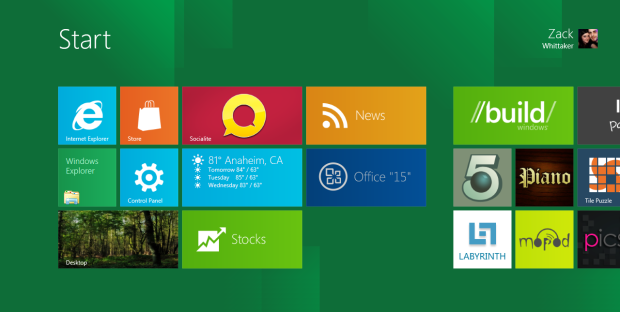Windows 8, Office 15: Get used to Metro, it'll be everywhere

Windows Phone-inspired, the Start 'screen' will replace the traditional Start menu, and will be the front-facing end of the next-generation operating system, Windows 8.
Pinching the user interface from existing Windows Phone 7 devices, in which the thin fonts and the application tiles reign free from the rest of the desktop, evolutionarily speaking it is truly a feat of ingenious for the mobile space.
But can Microsoft pull off the Start screen for desktops, and can Metro be successfully transposed to the desktop?

Microsoft is hedging its new operating system and its overall user interface design into its suite of other popular desktop software, including Windows and Office. It's a logical step, as Microsoft moves to bolster its image across the board in all avenues of its software and services.
Steve Ballmer, last week at Microsoft's Financial Analyst Meeting in Anaheim, California, did not rule out a'Metro-ization' of Office.
Speaking to analysts, he said: "We are rethinking and working hard on what it would mean to do Office Metro-style". An analyst asked: "The question is Metro interface for Office. How critical is it to Windows 8 adoption to have software that takes full advantage of Office with Metro?"
Granted, it is the gentlest of nudges in the direction we thought already would be the case. Whether it comes to fruition or not by the time Windows 8 comes out, we can only shrug our shoulders and guess.
For those plugged directly into the Microsoft matrix, it came as no surprise that while Redmond set focus on HTML5 and JavaScript for extensions and applications for Windows 8, it also made it clear that the same web-based languages would be core to the development of Office 15 -- the next-generation productivity suite.
But at what cost should a user interface direct the next-generation of a productivity suite? It's Office, not Windows. Not only does it have a different purpose, it has an entirely different ethos to the Windows ecosystem.
Take the BlackBerry PlayBook tablet as something to go by. Research and Motion focused its energies on getting its upcoming QNX-based operating system into its smartphones, but either lacked courage or the foresight to jump straight in there at the deep end with QNX-enabled BlackBerry phones As a wise move, it took a lesser investment in the tablet and used it as the testing ground for the operating system. Though only 200,000 PlayBooks were shipped, a huge round-down from the half-million mark that analysts were expecting, the PlayBook served one purpose to its full. It allowed the BlackBerry maker to focus on getting the next-generation QNX-based BlackBerry smartphone operating system functional and working, by using the PlayBook as the dumping ground for live 'in the wild' development and public testing.
But if Microsoft is taking the 'RIM-approach' by using Windows Phone 7 as a cheaper, lesser public option, by limiting its public testing options to only a fraction of the mobile marketshare, it is forgetting one clear cut factor.
If Metro is brought not only to Windows, it all but has to tie into the Office suite. The two run seamlessly side by side. While one is an optional, though logical addition, to an already burgeoning feature set of applications and web-inspired content.
From here, we can expect the wider range of 2012/13 inspired applications -- from CRM Dynamics to server-side applications. Plus, if Office "15" and Outlook "15" are to become Metro-inspired, then the cloud-based Office 365 suite will all but have to follow suit as well.
Even the Microsoft website had a makeover last year to 'Metro-ify' itself.
Metro isn't going anywhere any time soon, and Microsoft is clinging onto it as its next-generation look-and-feel of its products, applications and services. Beginning with a phone operating system that barely scraped the 5 percent mark last month in marketshare statistics,
But Office, not Windows, be the greatest test for Microsoft's up and coming user interface, from phone to desktop. If it can be pulled off without sacrificing measures of productivity and functionality, it should be onto a winner.
If not, may the higher powers have mercy on the soul of Windows as a wider platform.
Related:
- Mary Jo Foley: Microsoft Financial Analyst Meeting: Live from Build
- Microsoft to focus on HTML5 and JavaScript for Office 15 extensions
- Will there be a new application in Office 15?
- Should Windows get the 'Metro' Windows Phone 7 interface?
More: